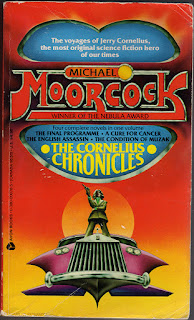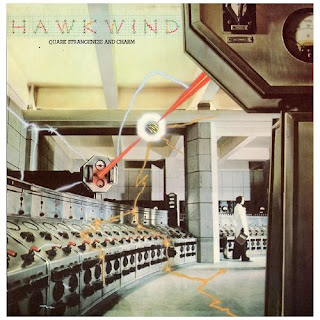From their first (and only) hit, 1971’s ‘Silver machine’, with lyrics by Calvert, and on the subsequent album In Search of Space, Hawkwind produced otherworldly music and explored science fiction themes, creating the template for a series of ground-breaking albums during the 1970s. In Search of Space and the follow-up album, Doremi Fasol Latido, introduced the ‘Starfarer’ concept, “a loose story line involving the adventures of Spaceship Hawkwind and its eventual crash-landing on Earth.” Calvert functioned as the band’s ‘resident poet,’ giving spoken-word recitals during concerts, composing lyrics and appearing as lead vocalist on record. Favourites on the UK’s then-flourishing free festival circuit, Hawkwind presented an on-stage spectacular with dancers and lightshow to accompany their live performances – captured on 1973’s Space Ritual, regarded as “the ultimate space rock album.” Lavishly packaged, the artwork was by regular associate, graphic artist Barney Bubbles, who also wrote a short sci-fi story of Spaceship Hawkwind for the performance programme, building on their existing overall Starfarer concept of the band travelling through time and space. Calvert’s manic-depressive condition and the demands of touring took their toll, and he drifted in and out of the line-up, his role on stage and as lyricist intermittently filled by his friend Michael Moorcock as a self-confessed “understudy,” who contributed ‘The Black Corridor’ (adapted from his own 1969 novel) and ‘Sonic Attack’ to Space Ritual.
A prolific author and, from 1964, editor of the magazine New Worlds – where he had published some of Calvert’s poetry – Moorcock found acclaim with the Cornelius Quartet of novels, following the weird and wonderful adventures of central character, Jerry Cornelius, a psychedelic harlequin-secret agent, an anti-hero of the times, picking his way through the debris of ‘swinging London’ and all points beyond. The first of the novels, 1968’s The Final Programme, was filmed in 1973 (though the result was much to the author’s disapproval); Mick Jagger was reputedly approached to play the lead, only to decline the Cornelius role as ‘too freaky.’ The Jagger connection was not coincidental – amongst other endeavours, Cornelius fronts a pop group known as the Deep Fix, a name Moorcock used in turn for his own musical project when he came to record the 1975 Concept Album The New Worlds Fair. In the same year he contributed lyrics to, and was credited as the originator of, Hawkwind’s album Warrior on the Edge of Time – based on his concept of the Eternal Champion, a recurring character found in different guises throughout his work, including Jerry Cornelius. The connection between author and group was further cemented by a series of dubious genre novels attributed to Moorcock and Michael Butterworth (though primarily the work of the latter, Moorcock’s name guaranteed respectable sales), beginning with Time of the Hawklords in 1976, featuring the band as protagonists in a series of sci-fi-inspired adventures.
Whilst Robert Calvert sadly died in 1988, Michael Moorcock remains a celebrated and successful author; a variety of splinter groups featuring original or one-time members of Hawkwind (including founders Dave Brock and Nik Turner) continue to tour the UK and world-wide, under a number of related band names. In their various incarnations they are recognised as innovators and prime exponents of a distinctive and enduring style, an influential and widely-respected group whose admirers include such diverse musical figures as Jello Biafra, Julian Cope, John Lydon and Henry Rollins.









